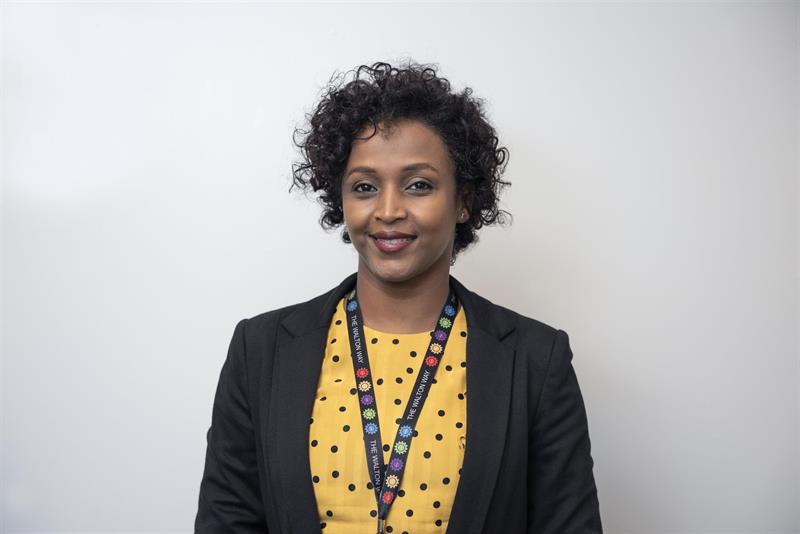Neuromyelitis optica
Service contact information
Service detail

The NMOSD service
It is essential for people with NMOSD to be treated early in their condition to prevent relapses and disability. Referrals received from consultant neurologists will be accepted, referrals direct from GPs will be accepted if it is likely the patient has NMOSD or if the patient has AQP4 or MOG antibodies
The aims of this NMOSD service are:
- To ensure early correct diagnosis and treatment of adults and children with NMOSD
- Education and support of persons affected by NMOSD
- Be a source of information and education to health care professionals
We provide:
- Expert input on diagnosis, assessment and treatments
- Acute admissions for relapse assessment and management
- Remote advice to local medical teams
- Patient telephone and email advice line, manned by the NMOSD Nurse Specialists
- Access at clinic appointments to a full medical and therapy team
Written information and access to websites on NMOSD
NHS England has acknowledged NMOSD as a rare neurological condition that requires specialist expertise and funds The Walton Centre NHS Foundation Trust in Liverpool and John Radcliffe Hospital at Oxford to provide the service.
The Walton Centre, Liverpool:
- wcft.nmo.advice@nhs.net
- Tel: 0151 556 4008
- Fax: 0151 529 2027
- Nurse specialists: 0151 556 4008
- NMOSD co-ordinator: 0151 556 4149
The Walton Centre NMOSD team
- Consultant Neurologist – Dr Saif Huda
- Consultant Neurologist - Dr Shahd Hamid
- Consultant Paediatric Neurologist - Dr Rachel Kneen
- NMOSD Clinical Fellows: Emily Gibbons and Mirasol Forcadela
- NMOSD Neurology registrar on an observership - Chiara Rocchi
- NMOSD Nurse Specialists: Sam Linaker and Tricia Kelly
- Orthoptist: Francesca Lynch
- NMO Counsellor: Stephanie Edwards
- NMOSD Co-ordinator: Diane Pickering
- Secretaries: Annette Topping and Elizabeth Gibb
- Occupational Therapist
- Physiotherapist
- Dietitian
John Radcliffe Hospital team, Oxford:
- nmo.advice@ouh.nhs.uk
- Tel: 01865 231900
- Nurse Specialists: 01865 231905
- NMO Coordinator: 01865 231900
- Fax: 01865 234837
- Prof. Jackie Palace – Consultant Neurologist
- Asso. Prof. M Isabel Leite – Consultant Neurologist
- Dr Sithara Ramdas Consultant Paediatric Neurologist
- Miss Sri Ramdas- Consultant Ophthalmologist (maternity leave)
- Mr Eleftherios Agorogiannis – Consultant Ophthalmologist
- Dr Anna Francis – Clinical Fellow
- Yvonne Sharawakanda – Specialist Nurse
- Madalina Miron – Specialist Nurse (maternity leave)
- Bindu Sathees Kumar – Specialist Nurse (maternity cover)
- Baerbel Christou – Physiotherapist
- Dr Liana Nagy – Occupational Therapist
- Dr Paddy Waters – Co-Director Oxford Autoimmune Neurology Diagnostic Laboratory
- Dr Mark Woodhall – Postdoctoral Research Assistant
- Miss Imogen Kendall – Laboratory Technician
- Mr Victor Mgbachi – Laboratory Manager / Research Assistant
- Alix Platt – Neurological Clinical Service Manager
- Lucy Thomas – Service Coordinator
- Scott Lambert – Database Analyst
- James Moore – Secretary
About the teams:
NMOSD Specialist Nurse
- Use us as a point of contact when you are worried or concerned about any new symptoms
- Information or advice regarding medication
- Support of for relapse concerns
- Advice and liaison with local neurology services regarding relapse management
- An assessment of your symptoms
- Referral to local therapists, continence adviser
- Information regarding NMOSD and medications to increase your understanding
Dietician
- Provide advice on nutrition and health
- For people with NMOSD, advice may be given for weight management (weight gain or loss) or for optimising nutritional status.
Orthoptist
- Assessment and quantification of your level of vision
- Relating this information to your visual needs and requirements
- Transferring this information to team members
- Bilateral visual loss will impact on
- Mobility
- Work
- Hobbies
- Social interaction
Physiotherapist
- Discussion around any physical problems you have identified. Examples can include reduced balance, limb weakness, stiffness, spasms Identifying any physical issues that have not been addressed up to now
- Information about any physiotherapy input in the past
- Information about any previous discomfort of injury
- Discussion around current levels of activity / exercise/ physical care programmes
- Referral to local services for further input can be made
- Referrals or provision of some aids such as walking sticks, hand supports, wheelchairs can be made
Occupational Therapist
- Discussion about your everyday activities and roles
- Questions about what you have stopped doing or never started
- Questions about your home environment and support
- Discussion about any previous OT input
- Discussion about impact of symptoms
- Analysing your lifestyle, activities and roles to identify areas of difficulty, and working with you to develop skills and learn ways in which activities can be successfully carried out
- Adapting the activity itself, for example, by advising on specialist equipment to assist in carrying it out or learning a new technique.
NMOSD Counsellor
- Provides help and support to patients including:
- Advice on coming to terms with diagnosis
- Advice on managing worries around long term illness and prognosis
- Referrals to local counselling servicing
The NMOSD service aims to deliver a comprehensive service for patients and includes:
- Diagnosis and management combining clinical, imaging and laboratory assessment
- Diagnostic services - testing (Aquaporin-4 and MOG antibodies)
- Relapse management
- Optimising medication regimes including rituximab
- Multidisciplinary team assessment
- Symptom management
- Lifestyle issues and health promotion
- Provides education, information, knowledge and a greater understanding of NMO
- Liaison and referral with local services
- Emotional support
You can get further information about diagnosis, symptoms, treatment and living with NMOSD on our patient leaflets.
Referral information
We welcome all referrals for:
- People with suspected NMOSD
- People diagnosed with NMOSD
- Uncertainty of diagnosis for people with recurrent Transverse Myelitis/Optic Neuritis
- Differential diagnosis for MS
- Advice regarding management
- Queries on all aspects of treatment
- Multidisciplinary team evaluation
NMOSD UK Paediatric Service
For children and adolescents with NMOSD, all care is managed by a consultant paediatrician who works closely with the NMOSD clinical team.
- Dr Rachel Kneen, Consultant Paediatrician, Alder Hey Hospital, Liverpool
- Dr Saleel Chandratre, John Radcliffe Hospital, Oxford
How to refer to the NMOSD service
Send a referral letter to Dr Saif Huda, at The Walton Centre, Liverpool OR Professor Jacqui Palace at Oxford, giving a brief history of the patient’s condition and/or symptoms.
Referrals received from consultant neurologists will be accepted, referrals direct from GPs will be accepted if it is likely the patient has NMOSD or if the patient has AQP4 or MOG antibodies.
To access the request forms for Rituximab and AQP4, clinical referrers should use these forms
Patient leaflets

Neurological Long Term Conditions For Professionals
The Long term condition team consists of five Physiotherapist and four Occupational Therapist, one Orthoptist.

Neuromyelitis optica (NMOSD) - Diagnosis, symptoms, and coming to clinic
Neuromyelitis Optica Spectrum Disorder (NMOSD) is a rare neurological condition. NMOSD affects the optic nerves and spinal cord, which can lead to optic neuritis and transverse myelitis. This leaflet provides information on diagnosis, symptoms, and coming to clinic for NMOSD.

Neuromyelitis optica (NMOSD) - Living with NMOSD
Neuromyelitis Optica Spectrum Disorder (NMOSD) is a rare neurological condition. NMOSD affects the optic nerves and spinal cord, which can lead to optic neuritis and transverse myelitis. This leaflet provides information on living with NMOSD.

Neuromyelitis optica (NMOSD) - Treatment
Neuromyelitis Optica Spectrum Disorder (NMOSD) is a rare neurological condition. NMOSD affects the optic nerves and spinal cord, which can lead to optic neuritis and transverse myelitis. This leaflet provides information on treatments for NMOSD and research areas.
Neuromyelitis optica Consultants

Dr Saif Huda
Dr Saif Huda completed undergraduate medical training in Liverpool in 2005 and completed neurology specialist training at The Walton Centre in 2017. Dr Huda is the clinical lead for the UK NMOSD highly specialised service.

Dr Shahd Hamid
Dr Shahd Hamid is a Consultant Neurologist at The Walton Centre. She completed her neurology training and obtained the CCT (Certificates of Completed Training) in neurology. Dr Hamid completed a research fellowship in neuroimmunology and NMOSD. She is an accredited clinical supervisor and Honorary Lecturer at the University of Liverpool.
Related Services
Neurology
The Neurology service provides specialist care to patients across Cheshire, Merseyside, North Wales and the Isle of Man.
Page last updated: 01 September 2021
64